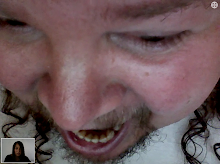by Thomas
A philosopher at a community college felt a sudden calling to be a brain surgeon. He went to a hospital and declared himself.
“Attention everyone,” he said a little awkwardly in his tweed coat. “Uh, actually I am not really a philosopher. I am really a brain surgeon.”
Some people objected, of course, but he was prepared for this resistance. He quoted Kant and the pre-Socratics at length. “I have studied the human mind, nuances of thought and epistemology – and I fixed my kitchen door once.”
“But you’ve never been to medical school,” objected the head doctor.
The philosopher was hurt. “I have just as much education as any doctor here,” he pouted.
After a shaky beginning (he took a while to get used to the equipment and the fact that he couldn’t smoke his pipe during surgery) the philosopher settled into a practice alongside other brain surgeons in the hospital. It wasn't easy. Other brain surgeons snubbed him constantly and made snide remarks about his corduroy pants and sandals and, most annoyingly, he was also frequently reminded of his very low success rate with patients. He tried to brush it off as jealousy, but after a while he grew indignant at the immaturity and intolerance of these supposed professionals who he had stoically hoped would understand him in time. He felt he was being marginalized by a clique of narrow minded philistines obviously threatened by his different but still quite rational approach to brain surgery.
He got a lawyer and sued the hospital for libel and harassment. With the millions he was awarded in damages, he bought a golf club membership and a large house in the suburbs to more fully steep himself in the culture of brain surgeons. He bought some scrubs to replace his tweed jacket and got some PBS videos on brain surgery to improve his success rate on the operating table.
He left the hospital and soon landed a job on a cable television show about ‘alternative brain surgeons’. With a little make up and some pointers from other TV doctors, the successful recovery rate of his patients soared. The show became a prime time hit and celebrities lined up to get brain surgery. He was interviewed by TV columnists and appeared on talk shows where he was praised for his more rounded, intellectual approach to brain surgery.
There was a big rift in the traditional brain surgery community. “We could learn from his experience,” said one eminent surgeon, hoping to patch things up. “His media techniques have brought brain surgery into the modern age.” Hospitals everywhere were divided into camps.
Medical bookstores experienced a massive demand for the works of Aristotle, Schopenhauer and other great philosophers. Medical schools scrambled to install resident philosophers in their programs and courses in Platonism, dialectics and existentialism became required for all medical students. Pipes became the rage.
The philosopher-brain surgeon enjoyed the patronage of ever more famous clients. Even people without brains came to him for consultation. At the peak of his career, he even operated on the president during a special CNN live broadcast, removing the presidents damaged, useless brain altogether and replacing it with a genetically bio-engineered sheep’s brain wired to a remote control. Everyone cheered at the tremendous success he had achieved after such horrible repression and discrimination from ultra conservative traditionalists.
Other brain surgeons lashed out, defending the increasingly embattled traditional brain surgery establishment with more and more abstruse and outdated arguments, harshly demanding extensive medical education and respect for proven techniques. Some fanatic fundamentalist brain surgeons wrote propaganda tracts on the health dangers of brain surgery from untrained people posing as actual brain surgeons, protesting the plethora of increasingly bold philosophers who were inundating medical clinics and setting up private brain surgery practices all over the country. Other reactionary extremists banded together to found exclusive hospitals that open rejected all but a dwindling number of brain surgeons trained in the traditional manner. They had excellent success rates, but the media ignored them.
Philosophical brain surgery went completely mainstream. Most patients were very glad that now they had a choice. The zeitgeist took root and soon a number of traditionally conservative professions like lawyers and astrophysicists opened their doors to those outside their sphere of education and experience. Plumbers became psychiatrists, yoga instructors became electricians and politicians became child care specialists. Laws protecting those untrained in the area of their chosen expertise entered the books and those previously barred from professions just because they had no relevant experience, training or education enjoyed every legal protection.
The philosopher brain surgeon became famous, an international hero. He wrote a famous book called The Alchemy of Identity in which he explained that, “We are all really the same. You don’t have to change to become what you want. You can change what you want to be what you are.”
After years of brilliant television brain surgery, the good doctor announced his retirement from medicine. Asked what his plans were, he smiled in an intellectually stimulating way and announced his future occupation.
“Why, to become God, of course,” he said lovingly. “After all, what could possibly stop me?”









No comments:
Post a Comment